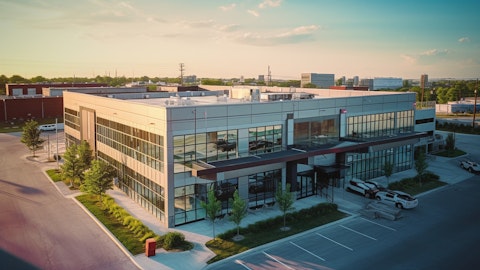Laird Superfood, Inc. (AMEX:LSF) Q3 2024 Earnings Call Transcript November 6, 2024
Laird Superfood, Inc. beats earnings expectations. Reported EPS is $-0.05, expectations were $-0.07.
Operator: Hello everyone. Thank you for attending today’s Laird Superfood Third Quarter 2024 Financial Results Call. My name is Sierra and I’ll be your moderate for today. [Operator Instructions] And I’d now like to turn the call over to Trevor Rousseau with the company. Please go ahead.
Trevor Rousseau: Thank you and good afternoon. Welcome to Laird Superfood’s third quarter 2024 earnings conference call and webcast. On today’s call are Jason Vieth, Laird Superfood’s President and Chief Executive Officer; and Anya Hamill, our Chief Financial Officer. By now, everyone should have access to the company’s second quarter earnings release, which was filed today after market close. It is available on the Investor Relations section of Laird Superfood’s website at www.lairdsuperfood.com. Before we begin, please note that during this call, management may make forward-looking statements within the context of federal securities laws. These statements are based on management’s current expectations and involve risks and uncertainties that could cause actual results to differ materially from those described.
Please refer to today’s press release and other filings with the SEC for a detailed discussion of these risks and uncertainties. With that, I’ll turn the call over to Jason.
Jason Vieth: Thank you, Trevor. Good afternoon. As usual I want to begin by thanking all of our investors that continue to follow and support Laird Superfood and to welcome all of you that are just joining the journey. Today I am once again thrilled to be able to share outstanding results for our Laird Superfood business. In the third quarter we grew net sales by an impressive 28%, marking the third straight quarter with strong double-digit net sales growth. This also marks another quarter where we delivered solid sales teams across both our e-commerce and our wholesale channels and where we are growing our top line while also holding or even increasing our spend efficiencies across both trade promotional and marketing activities.
Q3 net sales growth was once again led by our e-commerce business, which grew by an outstanding 42% year-over-year. Amazon sales once again led the way, increasing by more than 132%, driven by superior commercial execution and bolstered by stronger inventory positions in 2024 and a strong Prime Day execution. Our DTC platform also grew by 10%, even while up against a very challenging lap, given the level of promotional productivity that we executed a year ago. Virtually all of our DTC internal metrics were flashing green again in Q3 with subscription revenue up by 19%, average order size up by 8% and net sales from e-mail increasing by 38% in the quarter. Similarly, our sales on Amazon were driven by strong increases in subscription sales, new customer acquisition and gains in winning the buy box for our core products.
I’m also pleased to report that net sales from our wholesale business increased in Q3 by nearly 13% year-over-year. In the natural channel as measured by spins, our growth rate for the 12 weeks ending October 6, 2024 was 27%, driven by double-digit top line growth in all of the products that we measure including powder creamers, liquid creamers, coffee and instant lattes. This growth was driven by a nearly equal split of distribution gains and increases in our sales velocity. In MULO, we grew even faster, up by 40% in the same 12-week period ending October 6, 2024. And while we remain strategically cautious in expanding to the conventional grocery channel, I’m going to tell you that you’ll soon be able to find more of our products in new stores in several retailers across the country including, Kroger Albertson Safeway Wegmans and more.
Moving into operations. Our supply chain team continues to do a solid job of supporting our growing business. During Q3, we expanded our gross margin to 43%, which represents a 12-point increase versus the third quarter of 2023 and marks the fourth straight quarter that we have achieved at least, a 40% gross margin. This improvement was driven in large part by the strategic sourcing of our top ingredients where we will continue to focus during 2025. Our biggest operational challenge in the third quarter and frankly throughout 2024, has been in keeping product on retailer shelves and available to our e-commerce consumers. Because we have consistently exceeded our growth targets during the last few quarters, our supply chain has been in a perpetual change throughout the year.
The team has done an admirable job of juggling ingredient supply and manufacturing availability, essentially playing a game of Whac-A-Mole as they’ve moved from issue to issue. And while there have been some minor out-of-stocks during 2024, we remain in a strong inventory position and expect to be back fully in stock for the important Black Friday event and holiday buying season. I also want to share some of the progress that we have been making in building a more environmentally sustainable business. During the past year, we have been able to introduce 30% or more post-consumer recycled material into all of our creamer pouches as well as our nutrition and protein bars. Impressively, we have done this without any significant incremental cost to our business.
This is a meaningful ambition for our team and to our consumers, and we are in the process of outlining additional goals and creating a multiyear sustainability program. Many of you were with us during the turnaround that we executed over the past couple of years, and I’m pleased to be able to assert that we are now solidly into the transformation of Laird Superfood, into a high-growth premium branded business, with strong gross margin. But rather than asking you to take my word for it, I want to take a moment to dimensionalize it a bit, so that you can internalize it. Thus far in 2024, our net sales have grown by nearly 27%. At the same time, we’ve been able to increase our gross margin by 15.3 points going from 26.4% gross margin to 41.7%, which is well ahead of our financial goal to maintain gross margin in the high 30s.

Our net loss for the three quarters of this year has been shaved less than $1.5 million, which is nearly a $9 million improvement versus the same time period last year. And during the last 12 months, our cash balance actually increased by $776,000 from $7.4 million to more than $8.2 million as of September 30, 2024. And while Q3 and the entire 2024 financial performance has been a tremendous improvement versus our historical performance at Laird Superfood, we are even more excited about the future opportunities for our brand and business. As we have shared before, we still have a tremendous amount of white space to expand distribution and drive sales velocity growth within the natural channel, and we have not really even begun to expand into the conventional grocery channel or into the massive on-premise channel for food consumption.
We remain confident that we can continue to build our e-commerce business behind relevant, and engaging content from our founders and other influencers within health, wellness, nutrition and fitness. And as consumers increasingly seek out healthier and more natural foods, our Laird Superfood portfolio is perfectly positioned to fuel them in their journey. With that ,I will now turn it over to Anya to discuss our third quarter results in more detail.
Anya Hamill: Thank you, Jason, and good afternoon, everyone. As Jason noted in the third quarter, we have continued to make progress executing this strategy we articulated earlier in the year, which is to return the business to growth while improving profitability. I am pleased to share with you that our third quarter results were strong on every key metric, building on the first half of the year momentum and delivering significant improvements versus the same period prior year. Net sales grew 28% to a record $11.8 million compared to $9.2 million in the prior year period and were up by $1.8 million sequentially versus the second quarter of 2024. Our e-commerce channel led the company’s growth increasing by 42% year-over-year and accounting for 58% of our total net sales.
Sales on the Amazon platform had by far the best quarter in the company’s history delivering an impressive 133% growth driven by outstanding commercial execution and a better in-stock inventory position. Direct-to-consumer platform also grew 10% driven by a steady increase in subscribers and repeat orders, higher order value and lower discount rates due to strategic shift in promotional spend. Wholesale net sales increased by 13% year-over-year and contributed 42% of total net sales, driven by 36% growth in retail channel from new distribution and velocity acceleration as well as more efficient promotional spend. This was partially offset by timing of cross-channel orders. Gross margin for the third quarter came in at 43%, reaching a new high and expanding 12 points versus last year.
This margin expansion was driven by supply chain cost saving initiatives specifically from a strategic shift to direct procurement of key raw materials settlement with the supplier to recover costs previously incurred in connection with the quality event experienced in 2023, as well as reduction in inefficient trade promotion spend. I am pleased to highlight that this is the fourth consecutive quarter where we have achieved gross margins at/or above the 40% threshold. These results further support our expectation for sustainably achieving gross margins in at least the high 30s in the coming quarters. Operating expenses decreased $0.3 million in the third quarter compared to the third quarter last year, driven by lower sales and marketing costs as we improve the efficiency of our marketing programs.
This was in part offset by higher general and administrative expenses driven by higher professional fees and stock-based compensation, which is a non-cash expense. Operating expenses as a percentage of net sales were lower by 16 points compared to the prior year quarter as we focus on ongoing expense management in order to improve our bottom line. Net loss for the third quarter was $0.2 million, which is $2.5 million better than during the prior year period. Turning to our balance sheet. We ended the quarter with $8.2 million in cash and I am particularly pleased to report that for the second quarter in a row we have delivered a positive quarterly cash flow, which was $374,000 in Q3 and totaled $495,000 for the first nine months of the year, reflecting our improved performance and disciplined management of our working capital, which decreased year-over-year, excluding cash, while driving year-to-date revenue growth of 27%.
We also have no debt outstanding and no expected need to draw on our line of credit. We continue to project that we have enough cash to fund our operations as we grow our business and make operating improvements that drive us towards breakeven and profitability. Overall, we feel confident about the remainder of 2024. We expect continued growth in our core business segments as we remain focused on executing our strategic priorities. As such, we are increasing our full year guidance on both net sales and gross margin. We now expect net sales to be in the range of $43 million to $44 million for the full year 2024, which represents 26% to 29% growth versus prior year, and gross margin is expected to expand to approximately 41% to 42%, representing 11- to 12-point improvement versus 2023.
Looking ahead to 2025, we made a decision to strategically focus on growth. And in doing so, we expect to achieve 20% to 25% top line growth and to manage our P&L to positive cash flow and EBITDA. And now I will turn the discussion back over to Jason for any closing remarks.
Jason Vieth: Thank you, Anya, and thank you once again to all of you who are supporting our journey at Laird Superfood. Our last four quarters demonstrate an incredible turnaround in our business, one where we not only have shored up our finances, but have also returned our business to best-in-class growth rates in the industry. Operator, this concludes our prepared remarks, and we are now ready to open the call to questions.
Q&A Session
Follow Laird Superfood Inc. (AMEX:LSF)
Follow Laird Superfood Inc. (AMEX:LSF)
Receive real-time insider trading and news alerts
Operator: Thank you. We will now begin the Q&A session. [Operator Instructions] Our first question today comes from Alex Fuhrman with Craig-Hallum. Your line is now open.
Alex Fuhrman: Hey, guys. Thanks very much for taking my question and congratulations on a really strong quarter. Nice to see a really strong initial outlook for 2025. I wanted to ask a little bit more about where that growth is going to come from. I think, Jason, you mentioned in your prepared remarks that we’re likely to see a number of other retail doors coming. You named some impressive national accounts coming. Is that really going to be the biggest driver of your growth? Obviously, this year, it’s been more driven by the online business. Curious how you get to that 20%, 25% growth next year if that maybe looks a little bit different.
Jason Vieth: Hey, Alex. How you’re doing? Good to hear you again today. Yeah, I mean…
Alex Fuhrman: Good to hear from you as well.
Jason Vieth: Yeah. Thank you. It’s a great question and one that we’ve been pressing the team on. The reality on this, Alex, is we had a great year this year in the online business, the e-com business a bit unexpectedly. We had pulled a lot of the spend out, and we knew that we were getting the better marketing tactics, but we were really pleasantly surprised with the performance this year. And the great thing about it is we’ve a number — quite a number of our purchases to repeat purchasers and our repeat purchasers to subscribers. And as a result, we have very sticky revenue as we go into next year. And so we still feel really great about our ability to grow DTC. And at the same time, Amazon has been on fire, as you saw. And we know that we still have a lot of latent growth in Amazon, just executing the playbook that we’ve been running.
So we think that that e-comm business is going to continue to do really well. Probably, though we would expect even more growth next year as we look at the wholesale business. We did pick up a number of accounts as I just mentioned. And we’re being very strategic and selective with the retailers that we’re working with. I think, I had mentioned previously that we’ve been entering in with Target into a couple of categories and the performance looks good there and same thing with these other retailers that I mentioned. But the reality behind that too is our natural channel sales have been on fire, and it’s been a combination of additional distribution, including a lot that we gained this year as well as velocity gains. And they’ve been fairly equal as I had mentioned the velocity and the distribution gains that we’ve had this year.
So it’s really a case for everything kind of hitting at the same point. And that’s — sorry hitting — I’m sorry everything is really kind of hitting at the same time. And that’s the point that Anya was making with regards to next year, and how to think about our business. We’re going to invest in the growth. We have a lot of opportunities in front of us right now with consumers online, as well as retailers and their consumers and guests at their where they’re shopping out in physical stores. And we want to make sure that, we have sharp prices on promotion with extra display as much as we can and that we’re marketing behind brand and really getting to new consumers, but also leveraging the database the very strong database that we have. We have an incredible database with as we’ve mentioned over 0.5 million consumers that are very loyal to our brand, and we have the ability to launch new products into channels.
So you’re going to see strong growth across all of these channels next year Alex. And you’re going to see it come across frankly across all of our categories. We are winning in all of our categories. When I look at the spins report everything is green right now. Everything is lighting up green and it’s been that way this year. And it’s the same thing on the e-comm platforms of Amazon and DTC. So we’re going to just use — 2025 just reinvest and grow and build this business very carefully. So as you know we’ve been very good stewards with marketing dollars and we really watch the ROAS and ROIs very carefully. But we’re in a position right now, where we can spend effectively. And so we’re going to do that, and you’re going to see really great growth across all these channels as we go forward in our opinion.
Alex Fuhrman: That’s really helpful, Jason. Thank you. And then if I could just follow-up. As you think about your expansion into more mainstream grocery and big-box type retailers as well as the success you’re having in your more long-standing natural foods partners, which products have those two categories of retailers really been gravitating as you move towards some of these more mainstream bigger retailers are they opting for your core powder creamer SKUs? Or just any color on which products have been resonating as you open more doors would be helpful.
Jason Vieth: Yeah. Our legacy is the powdered creamers and we continue to grow those and they continue to do really well. But that’s a space — that dry shelf is a space that will never be as productive as the liquid creamers. And so from a sales velocity per point of distribution the liquid creamers are markedly stronger, but we’re doing well in both of those. When we go measure ourselves and analyze what we call quintile performance assessment where we go look at all the products that are on shelf, and break it into five quintiles, and look at where we stand we’re typically always in that top quintile or somewhere between Q1, Q2, or maybe into Q3. A couple of stragglers, but by and large we’re at the top of these performance metrics that we look at.
And so we look really good in both of those. The powder creamers had a rough year two years ago, but they had a really good year this year. And we’ve seen nice distribution growth as well as velocity growth and we’re flipping that liquid creamer over to a large size, which is going to be a 50% upsizing a 50% up pricing. There’s a little bit more value to the consumer. But really what it is. It’s just a convenience play to give them more creamers, so they don’t have to buy as often and run out at home. And there’s incremental consumption whenever you do that. So we’re really excited about liquid creamer as we go into next year. We’ve had some great distribution wins on that also. So, both of those categories Alex looked great. And then, the real surprise to me versus where — when I came in about two and half years ago, the coffee and the instant latte products have just been on fire this year.
They’ve driven a lot of our growth in grocery. They’re great online. And so we’re going to continue. We’re launching new SKUs in both of those new items in both of those categories. And we’re seeing a lot of success. We launched a protein creamer that we’ve sold out of a couple of times this year, and we just blew past our expectations and are now running bigger batches off of that. We have a new market creamer that’s coming out in the packet, in the — or I’m sorry, Matcha instant latte rather that’s coming out in that instant latte space. And then we’ve launched a couple of new coffee products and are continuing to bring more functionality specifically through the adaptogenic functional mushrooms, and retailers and consumers are really gravitating to those SKUs. So, I think those are the four product areas that you’re going to see really exploding as we go into next year in addition to green, which has been on fire all year for us.
Alex Fuhrman: Great. That’s really helpful, Jason. Thanks very much.
Jason Vieth: You bet, Alex.
Operator: Our next question comes from JP Wollam with ROTH Capital Partners. Your line is now open.
JP Wollam: Great. Hi, Anya, hi Jason. Thanks for taking the question. If I could just start maybe kind of touching on growth a little bit more. And I want to specifically go to kind of the discounts and promotional activity. It sounds like it’s going to be kind of a continued focus next year with the prepared remarks about investing some of that margin. And so, I was hoping you could kind of just talk about where you’re seeing the most success, what kind of promotion you are finding really resonate and just kind of how you’re thinking about next year in terms of discounting and promotional activity.
Jason Vieth: Yes. Hi JP. Thanks for that question. And I’ll jump in, and then Anya if you want to give your vocal cords a workout, you can jump in as well. So it’s really interesting JP. A year ago you probably recall we overspent on the trade line and we really invested too much into pricing. We felt the consumer is a little bit shaky last year and we were trying to entice them to purchases, especially first-time consumers and their purchases. And what we found is we gave too much away. And in doing that, we were really giving away our brand equity as well. So we made a strategic pivot at the end of last year really in Q4 and we’ve carried forward this year to do a lot less pricing promotion, and it’s been very effective. As you can see from the net sales increases that we’ve had this year selling at full price has worked out a lot better for us.
And what that’s done is it’s really let us keep up the premium cachet of the brand. We heard from our consumers specifically that we are a premium brand and surprised to see us on sale as often as we were last year. What we do now is we run fewer deeper sales online. So we leverage Amazon Prime Days. We leverage Black Friday internally on DTC. And then we have one other big sale on the DTC business. And then by and large we really don’t run a lot of promotions. Almost none in fact. And that’s working out really well for us because the consumers that are buying Laird at this point are really they’re believers in what the brand benefits are giving them the functionality of the food and they’re willing to pay for it at the price that it’s at without the need for promotion.
So, we’ve really backed away that pricing promotion and that extends into the grocery as well. We pulled back — Anya, what did we pulled back — probably 10 points or so of trade over the course of the year.
Anya Hamill: 11.
Jason Vieth: 11 points. Yes. Yes. And so that’s really a very strategic decision JP that we made to focus around quality promotions we call quality merchant. And that’s a function of getting a secondary display or getting into the circulars at grocers and what’s called feature and display. And so that’s really where you’ll see us poking next year. We have a couple of big planned or committed promotions will pick up that secondary display. And that’s just a tremendous way to introduce your products to a lot of new consumers in a tight timeframe. And so that’s really going to be where our focus is next year. But I would just think about it as more of the same in terms of the pricing promotion that we’re going to do. There will be more concerted marketing efforts to really build the brand and drive awareness and pick up more consumers.
We’ve found a number of marketing tactics that have worked really well over the last 12 months, especially those that leverage our founders and share the functionality of the food and general health wellness, fitness and nutrition tips. And so across the various media platforms where we’ve continued to invest and grow our subscribership, you’ll see us making a much more or a bigger and more concerted effort to drive awareness and build those consumer bases.
JP Wollam: Great. That’s very helpful. And then maybe just — I think Jason you actually kind of touched on it a little bit there, but if we just kind of step out and think about the customer base now, how are you guys thinking about the customer and kind of whether you extended — whether you’ve made that kind of next jump into sort of a new set of customers maybe a little bit beyond some of the very strict health and wellness-focused customers? Like could you just kind of give us — with another year of projected strong growth, have you made that kind of next jump into a new customer set? Or how are you thinking about where you kind of are versus a year ago there?
Jason Vieth: Yes. Well, that’s a great question and that’s one that is a smaller company without as much data as some of us are used to having it’s one that we extrapolate some of the data against quite often. So, look I’d tell you when I first got here a couple of years ago we were largely — really what we had our consumer set was — and I think of this in kind of an expanding circle diagram. So, at the core, we really — what we have we’re Laird and Gabby’s friends and family. And we’ve been launched essentially into groups that Laird and Gabby’s knew whether through Instagram or just leverage in some of the followership we’re able to establish there off of their own accounts. Or if it was just leveraging Laird and Gabby and who they were to people.
And so up and down the West Coast in the surfer community and then into some of the health and wellness circles, that’s really who our consumer was at that point with one exception. And one exception was we had done — and this was a few years ago, but we had done some executions, specifically with some influencer shoppers that would go up and down the aisles and throw product in. And what we found is that was great for onetime hits whenever you launch it but it’s extremely expensive and those were at the right consumers. So those folks largely fell away. And ultimately we were left with Laird and Gabby’s friends and followers. In that next 18 months or so when I got here, we really focused on getting to the health and wellness diehards. Specifically, kind of think about it in that West Coast area some of the enclaves health and wellness enclaves like Colorado parts of Texas, Austin, Dallas specifically, Minneapolis, Chicago you have some folks that are really focused on health and wellness.
And we really I would say targeted that core and didn’t really geographically make it to the East Coast. And there are a lot of reasons for that including just a little bit of a lower Q score or awareness score of Laird and Gabby the Hamiltons. And in the last year, I would tell you we’ve pushed that next — in the next concentric circle where now we’re pushing out from the diehard — what I call the health and wellness diehards into the kind of health and wellness aware. People that know they need to eat better that are hearing about functional foods that are trying the foods. And that’s why we’re so careful as we’re spending our marketing dollars and watching our ROAS remain very careful because once you start moving to a group that doesn’t know you as well or isn’t as aligned to those interests you can start spending very inefficiently.
And that’s where I’d say we’ve done in — our marketing team has been just an incredible job of holding on to those returns and carefully putting their toes into the pulls of a couple of people. And we’ve had very — I’d say in the last year to your question specifically you’ve had really great success in finding and tapping into new consumer sets. And so, we’re watching our geography expand. We’re watching our consumer set expand. And now because of the push into the conventional channel, I think we’re finding — now we’re going to find another set of consumers’ altogether. So yes, the answer is yes. We are expanding, but we’re certainly doing it with modest spend and very carefully.
JP Wollam: Great. Yes certainly, I have two question there. If I could sneak one last one in, I just want to maybe talk — I think this goes a little bit to sort of maybe the out-of-stocks or the inventory balance. And you guys have done a great job managing a really tight operation there. And I want to kind of get a sense of how you’re thinking about cash and your current liquidity position, just given sort of this return to growth. And I just want to know, how you feel given maybe a need to at times have a little bit more inventory or maybe if you’re wishing to have a little bit more inventory. Can you just kind of talk about liquidity please?
Anya Hamill: JP, this is Anya. Thank you for that question. Yes. So, as you know we put an ABL in place a line of credit, were put in place in Q2. We have not drawn on it, but we do have it available if we need to finance our working capital expansion. So far, we have been able to manage it efficiently, really balancing our AR, AP and inventory perfecting our sales and operations forecasting, refining that in order to really efficiently manage our working capital. But if we need it to grow next year, we have this ABL available should we need to draw upon it.
Jason Vieth: Yes. And so JP let me add a little bit more to that. So, we’re in a position as you’re astutely pointing out where we need to invest into additional inventory. We’ve been running very tight all year. And so we’re probably a little bit under-inventoried right now as well versus where we’d like to be. We’re also a very lean team, and we’ve got a team that’s really learning how to operate a just-in-time type of supply chain. So I don’t anticipate that we’ll have a very big inventory need. As Anya was mentioning, we do have a backstop in that ABL. We don’t plan to use it. It’s something that we put in place as we mentioned previously, just as a little bit of extra cushion because we could. But we’re still sitting here.
I mean we’ve increased cash, as you know, in the last year and we’re up what is it Anya almost $0.5 million and right around $0.5 million year-over-year. And we expect to be able to continue to generate cash. Next year, I mentioned, we’ll continue to in fact, increase our investment into growth next year. But at the same time, we’re not looking to shrink our cash now at all. So there will be that normal fluctuation from quarter-to-quarter, but I would anticipate that a year from now, we’re coming back to you guys and talking about how we once again increased our cash balances in 2025, just as we have done now in 2024. So, we don’t want to take — we don’t anticipate taking cash to operate our business. We don’t see any reason to. We believe that we have — as far as we can see, we have a very solid P&L now.
And for us, the only reason we’d raised cash now is, if we found that just that incredible investment opportunity in a new product or if we saw an amazing acquisition fit our business incredibly well, and it felt like it really changed the nature of our business maybe then we feel differently. But we have the cash, we need to operate this business. We’re confident of that right now. And so as we go forward, we just — we anticipate we have we’re just in a great place to able to continue doing what we’re doing.
JP Wollam: Great. Well, thank you for taking my questions. And best of luck going forward.
Jason Vieth: Yeah. Thanks very much. Appreciate it.
Anya Hamill: Thank you.
Operator: Thank you all for your questions. There are no longer questions in the queue. So I’ll pass the conference back to the management team for any further or closing remarks.
Jason Vieth: Yes, I’ll just close. I think you guys have heard enough from me today, but I’ll just close by saying that we can’t be more excited about where we are. And hopefully, you all agree. We’ve got a great year at Laird Superfood. We’re in a very fun position than we’ve been, at any point while I’ve been here. And at the same time, we couldn’t be more excited about where we are for the balance of this year and in general for our future. We’ve got, as Anya pointed out previously in this call, we’re in a great position for 2025 expecting to grow 20% or more next year and continuing to add to our cash balance on the balance sheet. So thank you all for joining us today. We look forward to getting back in front of you, with another quarter that hopefully, looks a lot like this one.
Operator: That will conclude today’s conference call. Thank you all for your participation. You may now disconnect your lines.
Follow Laird Superfood Inc. (AMEX:LSF)
Follow Laird Superfood Inc. (AMEX:LSF)
Receive real-time insider trading and news alerts





